Nouvelles des membres du Réseau Presentation: The evolution of articulation of organizational and collective interests in the deliberative process
Une présentation de Achille Dadly Borvil, membre étudiante du RRSPQ, donnée avec le support financier du RRSPQ à la Fuse International Conference on Knowledge Exchange in Public Health (Mai 8-10, 2018), Vancouver, Canada. Achille Dadly Borvil est l'une des récipiendaires du concours de soutien du RRSPQ à la participation à des conférences internationales (Hiver 2017-2018). Félicitations!
A lecture by Achille Dadly Borvil, student member of the QPHRN, given at the Fuse International Conference on Knowledge Exchange in Public Health (May 8-10, 2018), Vancouver. Achille Dadly Borvil is one of the winners of the Winter 2017-2018 QPHRN competition "Support for the participation in international conferences". Congratulations!
Auteurs/Authors : Achille Dadly Borvil, Natalie Kishchuk, Louise Potvin
ABSTRACT
Research shows that actors in an intersectoral governance structure share a dual identity. One related to their organization and one related to their new role in the Intersectoral Governance Group (IGG). This double identity requires them to defend both the interests of their organization and those of the GGI group of which they are members. The deliberative process is presented in the literature as the means by which actors manage to reconcile the two interests and to satisfy them simultaneously. It has also been shown that some actors find it difficult to align their organizational interests with those of the governance group in which they participate. This could explain the failure of some intersectoral programs to act effectively social inequalities in health. Based on a case of intersectoral governance, our research aims to understand how, in a deliberative process, intersectoral actors reconcile their organizational and collective interests. The case under study is the Montreal Initiative, a innovative cross-sectoral intervention to support social development in Montreal coordinated at the regional level by a committee of four partners from different sectors. Created in 2006 by public and philanthropic financial partners along with an associative partner representing frontline organizations, its objective was to address poverty and social inequalities in neighborhoods by supporting local consultative structures. In 2011, these partners began deliberating on revised management and evaluation plans. The review process lasted four years (2011-2015).
This presentation aims to document the evolution of the articulation of organizational and collective interests through an intra-sectoral and intersectoral negotiation process in a deliberative process by referring to critical incidents that occurred during the process of revising the Initiative. The critical incidents were identified through in-depth study of the Montreal Initiative documents (minutes, evaluation reports, activity reports, working papers), exploratory focus groups and eighteen semi-structured interviews conducted between December 2016 and May 2017 with stakeholders representing the four sectors that were involved in the review process. The results of this study have shown that a combination of organizational interest and personal leadership which is linked to a relationship of shared trust between actors leads to the articulation of interests in a decision-making process.

